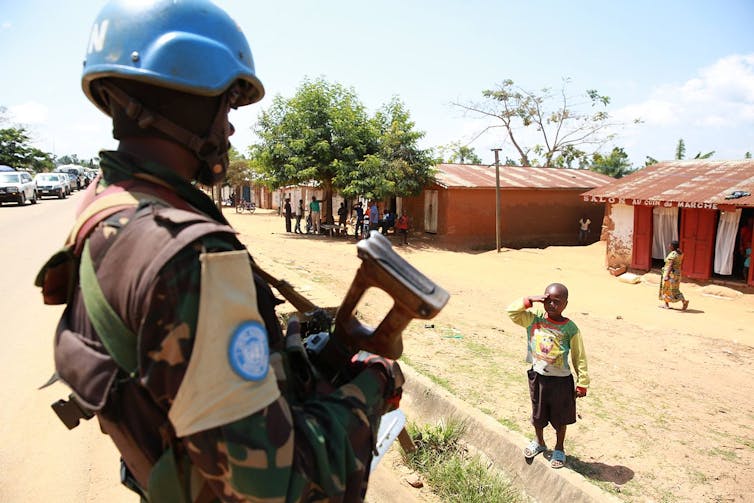
The Ebola outbreak in the Democratic Republic of the Congo (DRC) is quickly becoming an international concern. With 489 people diagnosed with the disease and 280 deaths, it is already the second largest Ebola outbreak in history (although still dwarfed by the 2014 West Africa outbreak). While the DRC has a good track record of responding to these outbreaks, the ongoing military conflict in the country is making the response much more difficult.
Healthcare workers have been attacked, vaccination campaigns halted and, most recently, experts from the US Centers for Disease Control and Prevention were recalled from an outbreak zone due to security fears. This is all despite the DRC hosting the UN’s largest peacekeeping force, MONUSCO (Mission de l’Organisation des Nations unies pour la stabilisation en République démocratique du Congo).
The United Nations Security Council (UNSC), the body responsible for maintaining international peace and security, acknowledged the situation in the DRC by issuing a resolution (resolution 2439) that calls for an end to the violence so that humanitarian groups can have better access to the region.
This is not the first time the UNSC has been involved in an Ebola outbreak. In 2014 it passed a resolution on the West African Ebola outbreak. This was the first and only UNSC resolution to acknowledge a health issue as a threat to peace and security. The resolution didn’t lead to military intervention, but it greatly improved the response in West Africa. The UNSC asked for resources and action, and the international community responded promptly.
This time, though, the UNSC response is much weaker. It condemns the killing of healthcare workers, calls for peace on both sides (which has been ignored) and calls on the World Health Organisation (WHO) to continue its leadership on Ebola, but does not say much else. With the violence continuing, the number of cases and deaths from Ebola rising, and the withdrawal of international health experts, it is likely that the UNSC will need to return to this issue – this time with a more robust response. But what form might this response take?

No easy options
One option is for the UNSC to do nothing. It could view the conflict as the responsibility of the DRC government, Ebola as the responsibility of the WHO and partner health agencies, and the mandate of MONUSCO being limited to traditional peacekeeping operations. Given the escalating situation, though, this option seems unlikely.
Another option is for the UNSC to draft another resolution, this time clearly linking the conflict in the DRC and Ebola. It would use stronger language than the last resolution to encourage an end to fighting and inspire the international response necessary to end the Ebola outbreak. A stronger resolution would reiterate the importance of the issue and draw international attention and resources to Ebola. However, without peace and security being assured, the international community is unlikely to send resources and people to the affected areas.
A more likely option appears to be expanding the role of the MONUSCO peacekeepers to take a more active role in protecting healthcare workers in the DRC so that healthcare workers can safely carry out their work. While the UNSC has moved away from authorising military-led peacekeeping missions, the fact that there is a peacekeeping force already in the DRC means an expansion of their mandate is more likely.
In particular, MONUSCO could create and maintain a corridor of safety when combatants are only engaged by peacekeepers if they enter this area. The UNSC created such a zone in the Iraq-Kuwait conflict as a form of humanitarian intervention so that water and aid could be delivered to civilians within the corridor.
Creating a safety zone around the Ebola outbreaks could allow healthcare professionals to carry out their work in safety and may inspire international assistance to flow into the area where it is so badly needed. While mission creep within peacekeeping operations is rightly subject to considerable criticism, if the situation in the DRC worsens, it may be the only option.![]()
Mark Eccleston-Turner, Lecturer of Law, Keele Law School, Keele University
This article is republished from The Conversation under a Creative Commons license.


